#quantic dream games references
Explore tagged Tumblr posts
Text
So, as I said, I'm currently obsessed with "Hey, Arnold"
But first, I'd like to share some sketches from the past year (unfortunately, there aren't many of them)

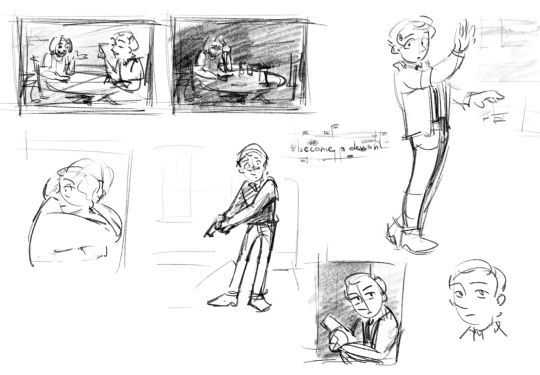

Let's start with "Detroit: Become Human", which I completed last summer and really enjoyed it!
(sorry, there aren't many of them, but I might come back to this game someday)


In the winter, I continued my marathon of Quantic Dream games
Heavy Rain!
I didn't expect much from this game, but it surprised me! I wanted to do a lot of things, and I even made some attempts at a comic (and ideas for an animatic), but unfortunately, they remained just attempts (maybe I'll get back to it someday)
I was charmed by two actors, Leon Ockenden and Pascal Langdale, who played some of the main characters in the game, Norman Jayden and Ethan Mars


And references)
I'll post more soon!
17 notes
·
View notes
Text
Pitch for a reimagining of Ace Attorney:
1) The game’s title
ACE ATTORNEYS
2) What’s the major reimagining?
Instead of a detective game, the game is choice-based along the lines of Telltale (like Walking Dead) and Quantic Dream (like Detroit Become Human). So you can actually lose the case and still finish the game.
Also, instead of different episodes with its own case, we have three cases that are played out simultaneously. We switch off between the 3 protagonists, just like Detroit Become Human.
Lastly, this’ll be more realistic than the original games. For this write-up, I’m using my own personal experience as a lawyer-in-training.
3) Storylines
(Note: Keep in mind, all these storylines are happening simultaneously with each other. The game switches POVs)
Storyline A: Local fortune-teller Maya Fey has been arrested for the murder of her older sister, Mia. Maya hires defense attorney Phoenix Wright, who also brings on a co-counsel, Franziska von Karma, who recently passed the bar (reference to OG Franziska being really young). The prosecutor is Miles Edgeworth, who has no prior connection to Franziska and Phoenix in this reimagining.
Storyline B: Phoenix Wright is currently going through a bitter divorce against his wife, Dahlia Hawthorne-Wright. They are fighting over everything, such as ownership of the Wright Law Firm, their house, and all their other assets. Phoenix is represented by divorce attorney Apollo Gramarye while Dahlia is represented by divorce attorney Klavier Gavin.
Storyline C: Apollo’s sister, Trucy Gramarye, is a celebrity magician with her own Las Vegas show. Recently, she’s sued a copycat magician named Rayfa Padma Khura'in, who she alleges stole her entire routine. Trucy hires entertainment/IP lawyer Simon Blackquill, who brings along his newest attorney Athena Cykes since she just passed the bar and needs experience. In response, Rayfa hires her own attorney, Nahyuta Sahdmadhi (side note: based on the real life Penn and Teller case).
So we got 3 main cases in different fields; criminal, divorce (family), and intellectual property.
4) The protagonists (should be obvious)
* Phoenix Wright: protagonist of the Maya Fey murder storyline
* Apollo Gramarye: protagonist of the Phoenix Wright divorce storyline
* Athena Cykes: protagonist of the Trucy Gramarye copyright infringement storyline
5) Other major characters (not a complete list)
* Maya Fey: A local fortune-teller and the main client of Storyline A
* Mia Fey: Maya’s older sister and the victim of Storyline A
* Franziska von Karma: Phoenix’s co-counsel and the deuteragonist of Storyline A (she fulfills the role of “assistant���, but only because she’s a junior attorney helping the senior)
* Miles Edgeworth: The prosecutor and main antagonist of Storyline A (main antagonist since you don’t actually find the supposed real killer, your goal is ONLY to get an acquittal for Maya)
* Richard G. Sho: The lead detective of the Fey murder case
* Dahlia Hawthorne-Wright: Phoenix’s wife who he’s getting divorced from and the main antagonist of Storyline B.
* Iris Hawthorne: Dahlia’s twin sister who plays a major role in the divorce proceedings.
* Klavier Gavin: Dahlia’s attorney and the secondary antagonist of Storyline B.
* Ema Skye: The accountant working with both Phoenix and Dahlia when it comes to determining how to split their community property (because she’s “scientific”)
* Trucy Gramarye: Apollo’s sister and a celebrity magician working in Las Vegas. She is the client of Storyline C.
* Simon Blackquill: Athena’s senior attorney
* Rayfa Padma Khura’in: A copycat magician who is sued by Trucy for infringement. She is the main antagonist of Storyline C.
* Nahyuta Sahdmadhi: Rayfa’s attorney and the secondary antagonist of Storyline C.
6) How the stories could play out depending on the player’s choices
* Maya could either be acquitted or deemed guilty. That being said, it’s never made clear whether or not Maya is actually innocent, unlike the original games.
* Phoenix could either lose a lot in the divorce settlement or Dahlia could lose. This storyline is more to determine whether or not Phoenix has a happy or sad ending.
* Trucy could either successfully shut down Rayfa’s show or Rayfa could continue to perform. Just like Maya’s story, it’s not made clear whether or not Rayfa intended to steal Trucy’s performance or if it was just an unfortunate coincidence.
7) Miscellaneous storyline stuff
* A plot twist in the Fey murder case could be that the Feys were deep in debt and Maya may have murdered Mia for insurance money. Maya could say she had no knowledge of the insurance money, which the player can choose to believe or doubt.
* A plot twist in the Wright divorce case could be that Phoenix was cheating on Dahlia with Dahlia’s twin sister, Iris (who is a nun in this reimagining). This could be a major factor in who ends up prevailing in the settlement.
* A plot twist in the Trucy copyright case could be that Rayfa and Trucy were friends when they were starting out as amateur magicians. This could be a major factor in determining whether or not Rayfa knew about the details of Trucy’s magic tricks.
* Obviously, the storylines do cross over with each other. Apollo visits his sister which leads to him meeting Athena, Phoenix has to deal with both the murder case and his own divorce, Athena could learn about Phoenix through Apollo and Trucy, etc.
#ace attorney#phoenix wright#apollo justice#athena cykes#maya fey#mia fey#franziska von karma#miles edgeworth#dick gumshoe#dahlia hawthorne#sister iris#klavier gavin#ema skye#trucy wright#simon blackquill#rayfa padma khura'in#nahyuta sahdmadhi#phoenix wright ace attorney#apollo justice ace attorney#ace attorney phoenix wright#gyakuten saiban#capcom#aa#ace attorney apollo justice#ace attorney fandom#trucy gramarye#spirit of justice#dual destinies#trials and tribulations#ace attorney justice for all
26 notes
·
View notes
Note
I’m curious what game/studio you’re referring to
This? I'm playing Heavy Rain rn (made by Quantic Dream), and I played their first game, Omikron: The Nomad Soul many many many years ago on my PC that ran Windows ME I think (may have even been Windows 95, idr).
Like, the studio has some really cool ideas as far as graphics and game play, and I don't hate the games enough to not play them. But even as a teenager, I recognized that Omikron kind of only had two types of women--whores or damsels, or some sort of overlap of those two archetypes, and Heavy Rain very much feels the same. Male characters seem to have a lot of interiority and complexity, whereas female characters kind of don't feel like they're afforded the same.
I think I had slightly higher hopes since this studio also made Detroit: Become Human, which I remember people having favorable opinions of at the time, and I thought maybe the'd grown past their characterization of women as like, useless lol. But when I was yapping about this to my partner yesterday, who played tf out of D:BH at the time, even he's like "Oh yeah no, women in that game are largely either portrayed as vessels or bitches." So. Yeah.
#my other non-feminist issue with the game is it plays like a visual novel#in that the quicktime events are sort of meaningless and don't influence the game play#unlike games like until dawn or the quarry or d:bh where there are consequences to your choices#this just feels like a mechanic to advance the story#and the story isn't that compelling to me#i genuinely dislike a lot of the main characters lol#and understand why parts of this game became memes#you can only run around yelling JASON or SHAUN so many times before you're like is this a joke. and i being run amok. is this just japes.#lo’s mailbox
2 notes
·
View notes
Text
wanted to link some quantic dream let's plays but also wanted link doesthedogdie pages for each game cause david cage is a freak and im pretty sure people are going to need the references. but some dtdg pages were missing ratings or the ratings weren't really truthful and needed context commented (cause like certain triggers are avoidable if you pass whatever sequence of QTEs).
so I'm watching game clips to make sure my memory is correct but these are all the worst parts of these stupid games. now I feel like a freak 😤 I gotta clear these videos from my youtube history when im done
15 notes
·
View notes
Text
Research: Games
No Man’s Sky
No Man’s Sky is an action-adventure survival game developed by Hello Games. The game focuses on you, a Traveller, as you travel across the galaxy and uncover its secrets as you also become associates with different aliens who guide you. The game’s main gameplay involves you going to different planets and galaxies to explore, collect resources and trade.
The game is much more infamous however for being a game that at first had a very negative reputation due to overpromises, only to slowly improve it upon the release of different updates and fixes.
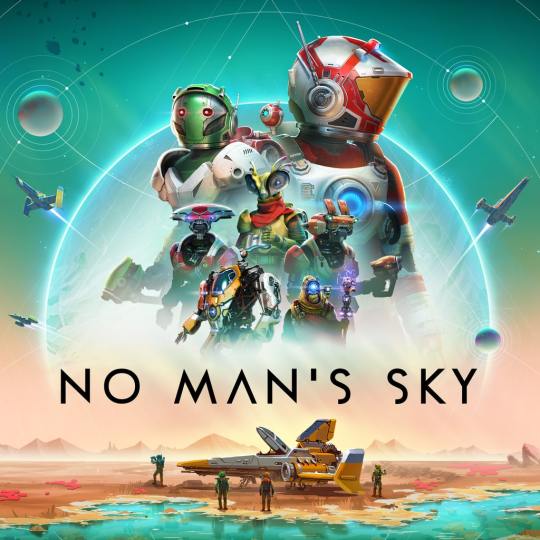
Halo
Halo is a first person shooter video game franchise set in the future within space, first developed by Bungie before the formation of Halo Studio. The overarching plot focuses on an attack started by the Covenant, aliens who wanted to avenge their ancestors, the Forerunners, with Master Chief being trusted to help against the Covenant and destroy the Halo ring.
With the release of the first game, Halo Combat Evolved, in 2001 alongside the original Xbox, the game became an instant classic and was praised for almost most things you can think of: Gameplay, graphics, soundtrack, the like. With this, Halo became heavily associated with Xbox and all games have been published on it (As well as any other capable Windows machine).
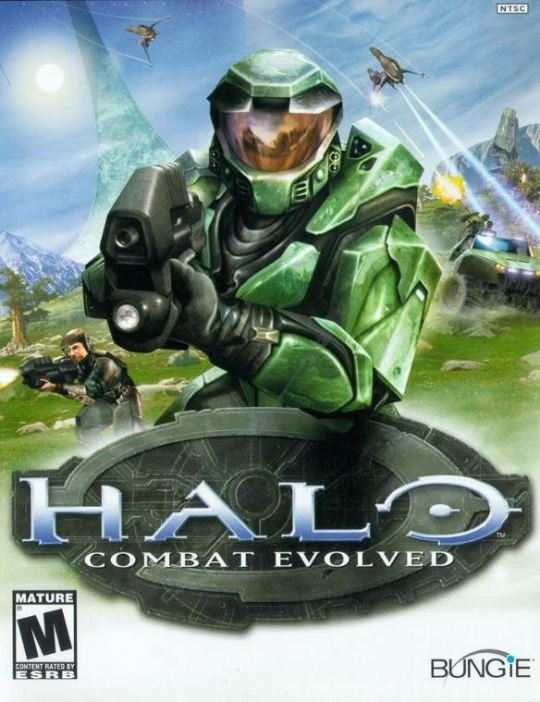
Subnautica
Subnautica is a 2018 action adventure exploration game by Unknown Worlds Entertainment. The gam centres on an explorer named Ryley Robinson, who's left to explore a weird planet and its oceans after becoming stranded. The game focuses on exploration, gathering resources and finding a way to protect yourself from the various monsters within, progressing until you can find a way to escape.

Space Invaders
Space Invaders is a 1978 arcade shoot em up developed by Taito. The game has you play as a ship with the goal of shooting lanes of aliens, the invaders, and making sure they don’t get too close to you. You have access to defensive walls that aliens can shoot at. The video game is one the first to be endless, and it was incredibly successful upon release. The game, while permeative by today’s standards, was an arcade marvel that helped unleash the “golden age” of gaming.
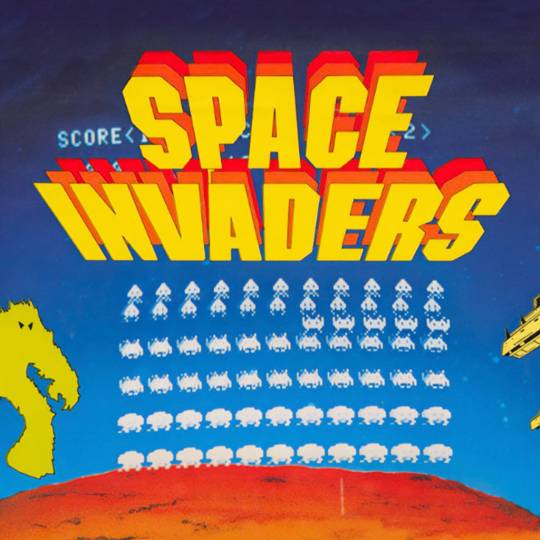
Galaga
Galaga is a 1981 fixed shooter arcade game developed by Namco and the sequel to Galaxian. In the game, you play as a ship that needs to destroy the Galaga aliens with increasing difficulty. The game, just like Space Invades, was considered a hit and a part of the golden age of gaming, although it didn't preform as well in arcade as expected. Despite that, Galaga has it's place in video game history.
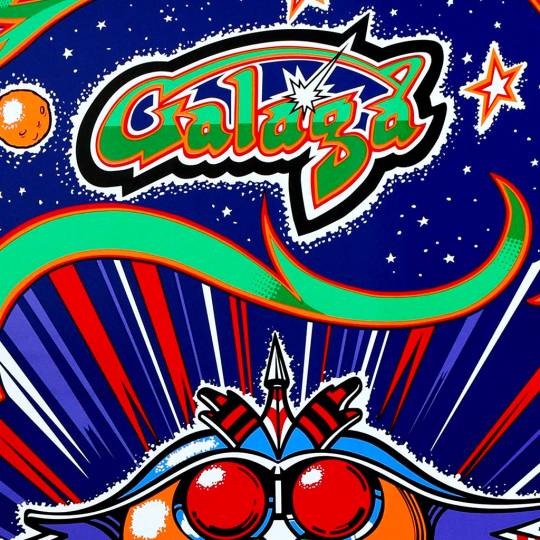
BioShock
BioShock is a video game series created by Ken Levine and developed by various studios, based on Irrational Games' System Shock 1 and 2. The games are set in a retrofuturistic and dystopian version of the 1960's, where one can have superabilites to fight. The series is also known for its psychological and moral themes. All of this combined has given BioShock a defined aesthetic not seen in other first person shooter games.

Metroid
Metroid is an action adventure game franchise by Nintendo. The games follow Samus Aran, an alien bounty hunter who protects the galaxy from space pirates and Metroid aliens. With the games combining side-scrolling platforming, exploration and adventure, Metroid was one of a kind, making it incredibly popular and iconic amongst Nintendo's vast titles.
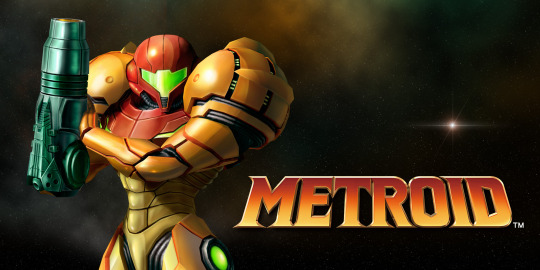
Detroit: Become Human
Detroit: Become Human is a 2018 adventure game developed by Quantic Dream. The game is set in 2038 and follows three characters: Kara, Markus and Connor, all of which are androids living a society that disrespects them and sees them as nothing but workers, but androids called deviants, who have disobeyed their purpose, also exist and plan to revolt against the humans.
The development history of this game is certainly interesting. Between the developers paying a visit to the actual city of Detroit to take photos to reference them in the game to contacting AI experts to ask the if the androids could feasibly exist, the developers really took no shortcuts in trying to provide a more realistic approach other concept of androids.
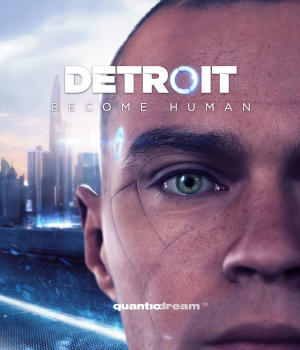
0 notes
Text
Project 4: Playing with the Machine
youtube
Heavy Rain
Heavy Rain is an interactive cinematic adventure video game developed by French company Quantic Dream. The game first released in 2010, famous for its narrative and the variety of choices the player can choose. Every decision the player makes affects the plot and can even change the characters' fates.
The story revolves around a serial killer who kills young boys, player has to investigate and save a kidnapped boy by controlling 4 different characters. The 4 characters are Ethan Mars, whose son has been killed by the murderer; Norman Jayden, a FBI agent; Scott Shelby, a private detective, and Madison Paige, a journalist.



The player controls 4 characters in the game, through multiple perspectives to carry out the story. Each character has their own storyline, their choices and action affect one another, as well as the overall outcome of the story.
Player must react quickly to the events in game, explore the environment, investigate objects, collect clues to push the story forward.
References: PlayStation (2016) Heavy Rain - Launch Trailer | PS4. Available at: https://www.youtube.com/watch?v=YVYiJ3VSp60 [Accessed: 21 October 2024].
videogamedunkey (2022) The Worst Father in Gaming. Available at: https://www.youtube.com/watch?v=k-VgRHXfmHo [Accessed: 21 October 2024].
0 notes
Text
Portfolio, Documentation and Pitch (Games Art and Design) - Learning & Reflection
I've been playing "Detroit: Become Human" (2018) lately, it's not a bad story and I ended up doing a robot destroying the world ending. The modelling and design of the characters are so great.
youtube
Reference
Detroit: Become Human (2018) [adventure game] "Quantic Dream"
PlayStation (2016) "Detroit: Become Human - E3 2016 Trailer | PS4" [video] https://www.youtube.com/watch v=QD1pbWCJcKQ [Accessed 14 Mar 2024]
0 notes
Text
had a real long addition comparing the "the shrink" scene in heavy rain to the zen garden scenes in "waiting for hank" and "public enemy"; the formula and purpose of those scenes are almost identical so it makes a really good comparison; 2 actors working on functionally identical scripts both doing mocap/facial capture/for some reason we keep just crediting them for voice acting even though theres a lot more to it than that even in the earliest quantic dream games but then i had it haflway done and it was 2 in the morning, and i still didnt like heavy rain, anyway the point is that shes elevating a script nearly identical to one other actors totally flat tired on and a lot of it is down to the way she uses eyelines and "status" - things that would not be in a script
i demand that this fandom respect that simbi kali did such an amazing job at acting amanda that it doesn't even seem like she's acting. it seems like shes amanda every day of the year and they just filmed her doing it this time.
its a marilyn monroe in "some like it hot" tier performance: that is, a performance effortless enough that you not only don't realize during it that you're watching 2 adults in stupid ping pong jumpsuits walk in circles while holding a dollar store umbrella, there are people that watch it and straight up dont even think of amanda as a character. amanda is "that person i hate that i met inside the video game." bro thats called being evocative, bro.
97 notes
·
View notes
Photo

something quick because i finished my first playthrough and i literally have no words because ive been screaming into the void for 2 hours now and i cant stop crying
EDIT: i dont have the sai file anymore but i tried my best to make up where i went wrong!! thanks for giving me a heads up, i see now how BIG the difference is and im glad people put my nose on it, i still have lots to learn with filters/lightsources/all in all colors, i never meant to whitewash anyone and i make sure not to repeat that mistake!! tysm!!!
#detroit become human#kara#luther#connor#markus#alice#dbh#quantic dreams#david cage#art#im avoiding the detroit tag because i dont wanna get spoilered for the the other endings#i love this game so much im physically shaking#the clothes might be inaacurate because i didnt get good reference pics yet
1K notes
·
View notes
Text
Tags masterpost
Post categories
image - either a single image or a few, with no correlation
comic - multiple images in a row, making a cohesive story (usually only fandom-related)
video - pretty direct, all posts that feature a video
text - a text post, ranges from fanfic to full on essays, or just tumblr banter
quote - a smaller text post, not worthy to stand amongst the longer ones
gif - either a single gif or multiple gifs, doesn’t matter, special gif posts will be tagged this way
screenshots - a very specific kind of image post (they’re a special kind of humor to me)
interactive - usually text posts where the OP made a quiz or something fun to reply to
ura talks - adding my own commentary just... anywhere
Fandoms I ever reblogged
The common pattern is that the full name is typed out, but that’s not a guarantee
assassins creed - Assassin’s Creed franchise (2007-) by UbiSoft
Any specific games under the franchise are tagged with their full name, like ac iii or ac odyssey
the owl house - The Owl House (2020) by Dana Terrace
genshin impact - Genshin Impact (2020) by MiHoYo / HoYoVerse
pretty cure / precure - Pretty Cure franchise (2004-) by Toei Animation
detroit become human - Detroit: Become Human (2018) by Quantic Dream
teen titans - Teen Titans (2003) the tv show by DC Comics
steven universe - Steven Universe (2013) by Rebecca Sugar
my little pony - My Little Pony (2010) by Lauren Faust
monster high - Monster High (2010) by Garrett Sander
Artist and writing tips, tricks, references and whatever
writing - writing reference - writing tips - writing prompts - main tags used for writing
writing romance - writing fluff - writing family - writing hurt/comfort - writing angst - writing friends - writing au - writing other - more specific writing tips/prompts
art tutorial - main tags used for art
drawing perspective - drawing backgrounds - more specific art tutorials
Post-specific tags for the vibes
serious - either for big world events that are not good, or some very depressing news in general
fanfic - either shameless advertising, or I reblogged a fanfic
relatable - posts I found wayyyy too relatable to not keep on my blog
introvert - goes hand in hand with #relatable, really
Expansion on the franchises
Assassins Creed (2007-)
ac i - Assassin’s Creed (2007)
ac ii - Assassin’s Creed II (2009) and it’s DLC
ac brotherhood - Assassin’s Creed Brotherhood (2010) and it’s DLC
ac revelations - Assassin’s Creed Revelations (2011) and it’s DLC
ac iii - Assassin’s Creed III (2012) and it’s DLC
ac liberation - Assassin’s Creed Liberation (2012)
ac black flag - Assassin’s Creed IV: Black Flag (2013) and it’s DLC
ac freedom cry - Assassin’s Creed Freedom Cry (2013)
ac rogue - Assassin’s Creed: Rogue (2014)
ac unity - Assassin’s Creed: Unity (2014) and it’s DLC
ac chronicles: china - Assassin’s Creed Chronicles: China (2015)
ac syndicate - Assassin’s Creed: Syndicate (2015) and it’s DLC
ac chronicles: india - Assassin’s Creed Chronicles: India (2016)
ac chronicles: russia - Assassin’s Creed Chronicles: Russia (2016)
ac origins - Assassins’ Creed: Origins (2017) and it’s DLC
ac odyssey - Assassin’s Creed: Odyssey (2018) and it’s DLC
ac valhalla - Assassin’s Creed: Valhalla (2020) and it’s DLC
ac mirage - Assassin’s Creed: Mirage (2023?) and potential leaks
Pretty Cure / Precure (2004-)
futari wa pretty cure - Futari wa Pretty Cure (2004)
futari wa pretty cure max heart - Futari wa Pretty Cure Max Heart (2005)
futari wa pretty cure splash star - Futari wa Pretty Cure Splash Star (2006)
yes pretty cure 5 - Yes! Pretty Cure 5 (2007)
yes pretty cure 5 gogo - Yes! Pretty Cure 5 GoGo! (2008)
fresh pretty cure - Fresh Pretty Cure! (2009)
heartcatch pretty cure - Heartcatch Pretty Cure! (2010)
suite pretty cure - Suite Pretty Cure♪ (2011)
smile pretty cure - Smile Pretty Cure! (2012)
doki doki pretty cure - Doki Doki! Pretty Cure (2013)
happiness charge pretty cure - Happiness Charge Pretty Cure! (2014)
go princess pretty cure - Go! Princess Pretty Cure (2015)
mahou tsukai pretty cure - Mahou Tsukai Pretty Cure! (2016)
kirakira pretty cure a la mode - KiraKira☆Pretty Cure A La Mode (2017)
hugtto pretty cure - HUGtto! Pretty Cure (2018)
star twinkle pretty cure - Star☆Twinkle Pretty Cure (2019)
healin good pretty cure - Healin' Good♥Pretty Cure (2020)
tropical rouge pretty cure - Tropical-Rouge! Pretty Cure (2021)
delicious party pretty cure - Delicious Party♡Pretty Cure (2022)
hirogaru sky pretty cure - Hirogaru Sky! Pretty Cure (2023?)
All other characters
Assassins Creed (2007-)
desmond miles - layla hassan - altair ibn la’ahad - ezio auditore da firenze - aveline de grandpre - edward kenway - shay cormac - arno dorian - shao jun - evie frye - jacob frye - arbaaz mir - nikolai orelov - bayek of siwa - aya of alexandria / amunet - kassandra - alexios - eivor varinsdottir - main characters of Assassin’s Creed (2007-)
clay kaczmarek - rebecca crane - shaun hastings - malik al sayf - mario auditore - henry green - fellow Assassin’s from Assassin’s Creed (2007-)
lucy stillman - cesare borgia - haytham kenway - deimos - main antagonists of Assassin’s Creed (2007-)
elijah miles - petruccio auditore da firenze - leonardo da vinci - side characters of Assassin’s Creed (2007-)
The Owl House (2020)
luz noceda - the protagonist of The Owl House (2020)
amity blight - willow park - gus porter - main characters of The Owl House (2020)
belos / philip whittebane - the collector - antagonists of The Owl House (2020)
camila noceda - vee noceda - caleb whittebane - flapjack - evelyn clawthorne / whittewife - masha - side characters of The Owl House (2020)
emerald trio - belos!hunter - whittebane brothers - honorary tags for The Owl House (2020)
veesha - lumity - miscellaneous ships in The Owl House (2020)
Precure / Pretty Cure (2004-)
yumehara nozomi / cure dream - nono hana / cure yell - all Pink Cures in Pretty Cure (2004-)
higashi setsuna / cure passion - hino akane / cure sunny - all Red Cures in Pretty Cure (2004-)
kurumi erika / cure marine - kaido minami / cure mermaid - all Blue Cures in Pretty Cure (2004-)
kurokawa ellen / cure beat - ruru amour / cure amour - all Purple Cures in Pretty Cure (2004-)
westar / nishi hayato - bibury - all antagonists, either main or minor, in Pretty Cure (2004-)
Detroit: Become Human (2018)
connor / RK800 - kara / AX400 - markus / RK200 - the main characters of Detroit: Become Human (2018)
hand anderson - side characters of Detroit: Become Human (2018)
connara - miscellaneous ships in Detroit: Become Human (2018)
Teen Titans (2003)
robin - starfire - raven - beast boy - cyborg - the main characters of Teen Titans (2003)
robstar - miscellaneous ships in Teen Titans (2003)
Fandoms and characters I kinda just... don’t care about...
my little pony - mlp equestria girls - monster high - mahou shoujo site - the random fandoms I once reblogged but am tagging now
sunset shimmer - starlight glimmer - cleo de nile - ghoulia yelps - rina shioi - also the associated random characters by said random fandoms
World events
net neutrality - here
Other miscellaneous tags
reblorbo - untagged - q - just some automatic tags I use to keep the mess that is my blog just a little bit in order
tumblr - amazon - random companies
bots - porn bots - yeah this is just my tag dump now
3 notes
·
View notes
Text
Research: Realism vs Stylism
“The less a work of art resembles something in the physical world, the more stylized it is.” (Essential Humanities, 2013)
Since starting my games design journey, I have been learning about realism and stylised artwork within the gaming world.
Coming from an illustration and costuming background, realism was something that wasn’t particularly important, it was how the items would be created that was important, and now I’m learning that, in gaming, there is an important distinction between the two styles.
Realism doesn’t necessarily mean that it should look like that the character or prop could exist, but more as though it should fit in our world.
Games such as Overwatch (2016), Dragon Age II (2011), and, to an extent, Borderlands (2009) are what I would’ve considered realistic in the past, but once looking at games such as Uncharted 4 (2017), Detroit: Become Human (2018), and Cyberpunk 2077 (2020), I have realised that there are some major differences, starting with the obvious graphics. Rendering is becoming more and more about the graphic quality, the clearness of the images, that the audience can hardly differentiate between an image from the games and a photograph or reference, this makes it seem more immersive to most players, as the games feel as though it could exist right now in our reality.

[Detroit: Become Human, Quantic Dream, 2018]
Compare this to the styles of the Borderlands saga, which initially used a lower quality rendering option that eventually got updated to 4K in an update in 2019. The art style of Borderlands features cel-shading, “a style of computer rendering that replaces the shading gradient of conventional rendering with flat colors and shadows” (TV Tropes, 2020) or simply; recreating how one would colour a piece of hand drawn animation physically. The games visuals are fun and bright, with characters to match, however, it is not realistic. The blocky look of the characters mixed with the bold flat colours give it a distinct and recognisable style that I personally feel is lacking in today's AAA industry.
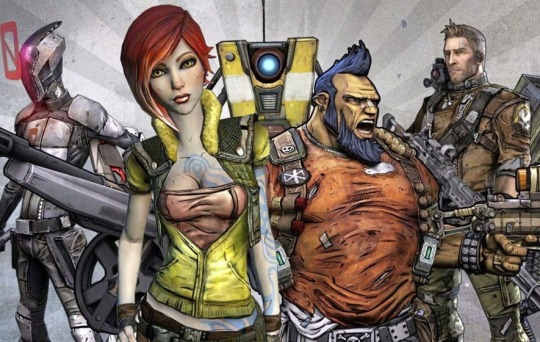
[Borderlands, Gearbox, 2009]
Neither realism nor stylism are better than the other, but I prefer seeing a game or film with its own style. I want to be immersed in a world that is completely different to my own, and stylism combined with a good story can really stand out in this industry.
In my work I want to be able to create designs that make the audience feel a certain way, for example; they see themselves and relatability in the design, or that the design makes the viewer feel sad / sympathy / happy / excited due to the styles used, and in my opinion, that’s the most important job of a designer, whether it be character’s, props, environments, ect, and a mentality I will take forwards in the future, as well as practicing how I design, my rendering abilities, and the way that I present my ideas.
Citations and References:
news.game.co.uk. 2020. 5 PHOTOREALISTIC GAMES THAT LOOK BETTER THAN REAL LIFE. Available at: <https://news.game.co.uk/photorealistic-games/> [Accessed 15 October 2021].
Photorealism in Gaming: Harmful or Helpful? (2017). Available at: https://comicsverse.com/photorealism-games-harmful-helpful/ (Accessed: 15 October 2021).
Borderlands explains its 'not cel-shaded actually' art style (2009). Available at: https://www.destructoid.com/borderlands-explains-its-not-cel-shaded-actually-art-style/ (Accessed: 15 October 2021).
Cel Shading - TV Tropes (2021). Available at: https://tvtropes.org/pmwiki/pmwiki.php/Main/CelShading (Accessed: 15 October 2021).
McGreevy, N. (2019) Games: Borderlands Game of the Year Edition gives classic 'loot-shooter' a modern make-over, The Irish News. Available at: https://www.irishnews.com/arts/2019/04/19/news/games-borderlands-game-of-the-year-edition-gives-classic-loot-shooter-a-modern-make-over-1600737/ (Accessed: 15 October 2021).
2 notes
·
View notes
Text
My brain refuses to contain those ramblings, so there.
Musings about quasi-religious visual references in Connor’s story and me being baffled by them below
And here I was thinking - where are weird occultish themes, it’s Quantic Dream game we’re talking about. And bam! - insight, here they are.
I’m always down for some Amanda=Cyberlife=android god headcanons, so the first parallel is obvious. Zen garden is the garden of Eden, Connor is an enactor of divine will. He can get into garden only when summoned, it structured almost as vision. Also note that Amanda is sort of omnipresent even (especially) after Connor’s deviation. And constant talks about doubts...
Who are deviants in this scenario? Heretics, i think. They reject the orders of Cyberlife=their creator, and try to rebel against them. In relation to them, Connor is akin to inquisitor. Interrogation chapter comes to mind immediately.
Of course, Kamski fits the devil archetype. He was part of Cyberlife but left, he’s ambivalent towards androids (perfection vs just object). It’s implied that he created deviation as a revenge to Cyberlife. He’s tempting Connor with knowledge. But it’s interesting that ultimately Kamski works in the interest of Cyberlife too. If Connor kills Chloe and asks the right question, he gets acess to Jericho (yeah direct reference) and gets a chance to kill Markus, without whom revolution is doomed.
I’m not really sure how Connor’s reincarnations/resurrections fit into that, but maybe it is self-explanatory. Resurrection to fulfill the higher purpose, all that. Demonstration of Cyberlife power over his life or death. Markus has this too, btw, he’s a messiah, after all, but he sort of resurrects himself.
I’m left questioning who is Hank in all this. Who are humans at all? Honestly, I don’t know. I was thinking around the edges of idea Connor - righteous man and Hank - sinner. Not in the meaning of something sexy (at least not only thatX)), Hank’s sin is that he doesn’t want to live. And there is some vague connection between Kamski and Hank - Hank knows where to find him, and in Kamksi ending he accepts the drink from Chloe after the scene of Hank commiting suicide...
Also lets not forget that Cyberlife is evil corporation, so its godlike religious imagery is rather sinister. They create androids in human image - they only copy, in other way. They vehemently deny that androids can have feelings, love and hate - refuse to accept that androids have souls. They seek power and total control over all fields of human life - we can see it in magazines and on tv in the game, there are android zoos, sportsmen, singers, doctors, teachers, android president is discussed, android life partners are popular. But all this happens before the revolution. The minute androids stop being obedient Cyberlife merch, means of their control, they become ‘public enemies’.
1 note
·
View note
Note
Are we forgetting the Detroit become human phase user cruelzy
In my personal opinion I think it is very rude to assume that just because I may have been involved in something in the past it counts as a “phase.” Not only that but it is immensely disrespectful of you to refer to my username which has, quite frankly, nothing to do with this specific line of questioning. When you wrote this did you consider how inappropriate it was? No. Detroit: Become Human made by Quantic Dream is a game played by electronically manipulating images produced by a computer program on a television screen or other display screen. You’re making me uncomfortable and I don’t tolerate any measure of slander in my personal space. I’ll have you know that anything on the internet is fully recognizable in the court of law. This video game you’re referring to reached fifth place on the UK chart after two days of release. In its first week, the game topped both the overall sales and console sales charts. Though it sold fewer copies than Beyond: Two Souls and Heavy Rain in that region, Cage and executive producer Guillaume de Fondaumière claimed Detroit: Become Human was the studio's most successful launch yet. The NPD Group later confirmed it had a sales growth in excess of twenty percent over Heavy Rain. It was the third best-selling video game overall, generating the third-most revenue in the US, and sold the most out of any title on the PlayStation Store in May 2018, having been available for six days. The game released in Japan with 39,548 units (which rose to 56,480 after two weeks), second to Dark Souls: Remastered. In the UK, the second week also saw it become the second best-selling video game (behind FIFA 18).
5 notes
·
View notes
Text
Detroit: Become Human - Review (PS4)
10/7/19

Developed by Quantic Dream, released May 2018
Quantic Dream is a French studio, making a name for themselves with narrative and character-focused games. These titles sometimes resemble more of an interactive digital film, rather than a traditional video game. Indigo Prophecy (Fahrenheit), Heavy Rain, Beyond: Two Souls, and now Detroit: Become Human consist of their releases. David Cage, the writer and director of these games (and founding member of Quantic Dream), seems to have a strong fan base, but many people think he is overrated or controversial. Personally, I’m a fan of his games, but feel like the formula that the series has stuck to for a decade and a half hasn’t evolved enough over time. Detroit: Become Human continues the format of multiple protagonists, quick-time events, player choice, and depressing stories focusing on dark journeys for its characters.
Detroit: Become Human is split between three heroes: each an android of the near future, who endure perils of awakening from tool to sentience. Kara (Valorie Curry) is an android who runs away with her owner’s daughter Alice after witnessing physical and emotional abuse from her father. Conner (Bryan Dechart) is an investigator android, working for the police department, specifically tasked with hunting down androids who have rebelled from their programming and strive for independence called “deviants.” Lastly is Markus (Jesse Williams), who becomes a revolutionary of the android race after being destroyed and left for dead in a junkyard. The story switches between each of these characters, and there are tons of directions the story could go for each person, making for excellent replayability.
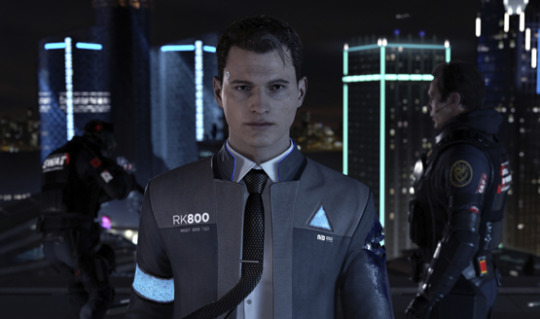
If you’ve played any Quantic Dream before, you’ll know exactly what to expect with this game. This is the entry that seems least evolved from prior Quantic Dream games, which is slightly disappointing. The story begins with Conner negotiating with a deviant android who is threatening the life of his former owner. This acts as a great tutorial hooking you to the story, teaching the gameplay mechanics, and demonstrating consequences of what you do. My only problem with this from a story perspective, is that we immediately see androids evolving past their programming, and achieving sentience. This is one of my problems with the game: there is little to no explanation on what makes them deviate, referring to it sometimes as a glitch in the software, simply it being there all along until the android discovers it (or being automatically “awakened” by a touch by a deviated android as we see Markus doing for others).
The rules of the androids are underdeveloped and inconsistent, and its one of the things that broke my immersion. For all the time we spend playing as androids, there are many things that got little to no attention in favor of drama and plot. I never had a good idea for what their physical and mental limitations were. Sometimes and android would have a skill such as instantly transferring their consciousness into another body simply by touch, or had extreme reflexes, but these skills not being used in the story except for when it’s convenient to the plot. I don’t need the game to be pure exposition, but a lot was focused on that could have been better served making sure the rules and technicalities were defined.

The stand out feature of Detroit: Become Human, as are with other Quantic Dream games, are its graphics. There were genuinely several small moments where I forgot I was playing a game, and was convinced I was watching a live-action scene. It’s obvious the voice actors also did the motion and facial capture to bring their characters to life. This is the case with most of the characters in the game as well, not just the three main protagonists. Everything from man-made objects to weather effects look perfect and incredibly realistic. Even skin tones and clothing, something most games struggle to make look realistic, constantly impressed me. Lighting, animation, and virtually all other visual effects are excellent, and probably won’t be topped at least until the next generation of gaming.
The same complements could be said for music, and overall emotion the game can deliver. David Cage knows how to build a scene, even if it doesn’t make perfect logical sense. Many chapters (out of 32) swelled me with emotion, a combination of great directing, acting, and animation. You really do feel like part of a major civil rights movement by the end of the game. It makes me think if the game would have been much better if it dropped its sci-fi angle, and portrayed an actual revolutionary period, not having to worry about making up rules for its fictional setting. On the flip side, a few chapters did feel monotonous and boring, and I wanted them to end as quickly as possible. Most of these chapters happened to be of Markus’ story. Once he begins a search for the android revolution headquarters, he is made its leader for no special reason, other than he is the player’s character. He came from a great life and there’s no particular reason why he was made this big influential person.

My favorite character to play as was Conner, mainly because his character felt the most robotic and android-like. Seeing him remain analytical, or try to remain analytical, despite the change around him, was the most interesting story to be a part of. However, the game is also stuffed with cliched characters, ones you could read the personality of simply by looking at them. Hint: if a man is overweight, has a beard, and has slick hair, he’s a bad guy, or at least a douche bag. The game truly runs the spectrum of good and bad characters. A particular character that I felt was pure cringe was Conner’s boss Lt Anderson, a drunken, pessimistic, suicidal, lose canon cop who has a dark past and hates androids. Every scene he’s in I felt like I’ve seen a hundred times in other media, even if he was voice acted well.
Detroit: Become Human is better than the sum of its parts. Like other Quantic Dream games, this is a narrative and character driven experience that will fill you with all sorts of emotion, empathy, and conflict, but contain some UI and story fallacies that I couldn’t always ignore. The best complement I can give it, is I found it hard to put down. This is one of the more meaty Quantic Dream games, and I discovered it difficult to stop playing from one chapter to the next. I was invested all the way through, and saw dozens of multiple paths I could have taken than the ones I chose. The game even gives you a thorough flow chart to truly show you how many outcomes there were in every given chapter, and it makes me want to take opposite paths next time I play in the future. You could spend a lot of time uncovering every scene, or at least the majority of the scenes that have been made for the game. This is a David Cage game through and through, which should tell you exactly what to expect.
7/10
#quantic dream#david cage#detroit become human#detroit#ps4#exclusive#sony#indigo prophecy#beyond two souls#heavy rain#the nomad soul
8 notes
·
View notes
Text
Detroit
Can robots feel? To empathize? To do? Despite years of research, scientists do not give clear answers. And where science is powerless, fiction comes to the fore. Last year, with the help of NieR: Automata, Taro Yoko tried to get to the truth. Now David cage, the author of the interactive thrillers Heavy Rain and Beyond: Two Souls, has decided to present his view on the problems of artificial intelligence. Well, guys, myltso? On the blade Near future. Technology has made another leap, and the achievements of Boston Dynamics are in the past: androids are already among us, their appearance and behavior are barely distinguishable from ordinary people. Indispensable helpers and cheap slaves in one person, the" children " of CyberLife have been performing the most thankless work for years, bearing the humiliation of the Almighty masters. But nothing lasts forever: suddenly, in Detroit, one after another, deviants begin to appear-machines that have gained self-awareness.
Detroit: Become Human
In a matter of months, humanity is on the verge of war with its greatest creation. Now, in the darkest hour, the fate of the world depends on the actions of ordinary robots, not people. Marcus, the old artist's Butler, is stranded on the street in an accident. Connor, a police officer, hunts for "broken" brothers and tries to find out the reason for their madness. Kara, the housekeeper, runs off with her owner's daughter when he raises his hand to his own child. Heroes are waiting for incredible adventures, and their paths will cross more than once. And who knows how their amazing story will end?
Light, camera, shame Video games have long been made with an eye on Hollywood. Game designers spy on the Directors ' techniques, more and more screensavers from year to year, and the traditional gameplay is regularly replaced with spectacular QTE. It seems as if developers want to" shoot " movies, rather than sculpt conveyor blockbusters. Only a few people have the courage to say this openly. Few people except David cage and his Studio Quantic Dream.
Detroit: Become Human
Unlike other famous teams, the French company has long ceased to disguise itself: since 2005, it has been exclusively engaged in interactive cinema, where there is no place for shootings with terrorists, boss fights, or other distracting nonsense from the narrative. Cage's logic is impeccable: the industry is already littered with shooters like Call of Duty, why not do something original? But to create such masterpieces, you need skill. Talent. And here's the problem: the Frenchman has nothing else but naked enthusiasm.
Omikron: the Nomad Soul, Fahrenheit, Heavy Rain, Beyond: Two Souls... Each of his opus is a story about how a good idea was ruined by a bad performance. Whatever the game, it's a beautiful dummy-fascinating at first, and then, closer to the final, falling apart. So it was hard to expect anything good from Detroit: Become Human (with its banal beginning). And all the same old cage I found something to surprise.
Detroit: Become Human
Double Detroit is an emphatically cinematic adventure that tells the fates of several characters at once. As before, the player is required to do relatively little: walk around locations, collect or view garbage, talk a lot, pass sophisticated QTE and survive. Yes, unlike many of the genre's peers, in Become Human (as in the ever-memorable Heavy Rain), the characters can die, and the plot will move on quietly — though, already in the direction of a bad ending. This is not a peaceful LucasArts quest.
Already from the introductory chapters, the new product is perceived as one big work on mistakes — as if all these years the authors studied reviews of their creations, threw out unsuccessful elements and kept working. The output turned out to be a kind of collection of "the best of". Check the boxes: a futuristic world a La Omikron (alas, without David Bowie), an intriguing Fahrenheit introduction with dozens of scenarios, investigative episodes, the death of the protagonists and elements of the heavy Rain interface, Hollywood actors just like in Beyond. Even the main menu resembles the beginning of the Nomad Soul — only instead of a low-poly model, a beautiful girl breaks the fourth wall. Try not to blush.
Detroit: Become Human
And it seems that everything is familiar, familiar, but there is nothing to swear at: from the point of view of game design, the game is made wisely. Even the usual genre flaws here, in the new context, do not look so scary and critical. Do robots speak in an unnatural, UN-human way? Logically, the same pieces of iron! Invisible walls prevent you from exploring locations? Of course, the program does not allow you to deviate from the set course! Bullets don't kill or even slow down characters during action scenes, and wounds heal too quickly? Cars, what to take from them.
However, these are rather pleasant things — the really impressive thing about Detroit: Become Human is something else. Here (unlike the series of some Telltale), the decisions made by the gamer during the "movie" really affect what is happening — very noticeably change the story. At first, the linear narrative branches out over time: unique mini-episodes are opened, even fleeting dialogues and individual chapters vary. And endings are determined not by the choice of a specific scene in the final, but by a number of not always obvious moments. How thoroughly did Connor study the crime scenes? Had Kara managed to escape from her master? And how?
Detroit_ Become Human_20180522213231
Conceptually, the mechanics are similar to the "butterfly effect" Until Dawn (or the earlier Blade Runner from Westwood): do something or say-prepare for the consequences, the authors will not allow the descent. Unless in the Supermassive Games horror movie there were much less variations of the development of events: in this regard, chamber horror is difficult to compete with the cyberpunk epic. Quantic Dream employees have done a lot of work, and they do not hesitate to demonstrate this by drawing giant diagrams at the end of each Chapter, similar to the intricate chronology of some Metal Gear Solid. A good way to mask loading screens!
In other words, in terms of gameplay, the new product really succeeded. Taking the best of their previous creations and borrowing a couple of other people's inventions, the authors finally fulfilled their promise: they released a real interactive movie. Hooray? Hooray. But unfortunately, Detroit is still David cage's "Need more emotion" game. With all the consequences.
Be a man Alas, in the five years since the premiere of Beyond, the head of Quantic Dream has not learned to write good scripts. Even with the help of new assistants and editors, all he managed to compose was at best a mediocre melodrama about racism, where the roles of oppressed Negroes were assigned to soulless androids. Vulgar metaphors and clumsy references to real historical events (up to the Nazi concentration camps!) attach.
Detroit: Become Human
Admittedly, it's very funny to watch such obvious and artless nonsense in 2018. There are no bright new ideas, unprecedented sci-Fi concepts, or unique views on AI problems. Instead — it is a continuous repetition of what has been studied with a lot of loud words, high-sounding platitudes and obligatory tears in artificial eyes. The characters are all drawn up according to the textbook of archetypes and communicate such Terry platitudes that at times the game borders on self-parody. Sometimes it even seems that Lieutenant Frank Drebin from the Naked gun is about to turn the corner and everything will fall into place. But that would be too subtle. Well, at least there was no nonsense in the spirit of Heavy Rain, that is, attempts to hit and turn what is happening upside down, somehow. Here everything fits into the fragile logic of a fabulous cyberpunk universe, where a robot service can be bought for a measly 899 dollars, and Canada is a futuristic Wonderland.
However, not everything is so sad. There are also good scenes in Detroit — and such that it's not even a shame to watch! They are concentrated mainly in the storyline of Connor (who has to play a buddy movie in the spirit of the series "Almost human"). There is humor, and "chemistry" between two dissimilar partners, and quite a sensible dialogue almost without stupid "snot", from which it is time to roll your eyes. Looking at the amazing adventures of an Android and a grumpy detective Anderson, you keep asking yourself: "why the hell are there two other protagonists in this game?»
1 note
·
View note
Photo

Michelle is a good soldier but geography isn’t really her strong point =D
And yes in case you’re wondering I made some references to Quantic Dream’s game masterpiece world.
Wishlist the game here: https://store.steampowered.com/app/857200/Planet_Stronghold_2/
8 notes
·
View notes